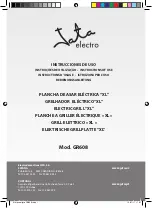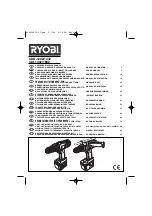
46
b
Avoid body contact with
earthed or grounded surfaces,
such as pipes, radiators, ranges
and refrigerators.
There is an
increased risk of electric shock if
your body is earthed or grounded.
c
Do not expose power tools to
rain or wet conditions.
The
ingress of water into a power tool
will increase the risk of an electri-
cal shock.
d
Do not misuse the cable by
using it to carry the power tool,
to hang it up or to pull the plug
out of the socket. Keep cable
away from heat, oil, sharp
edges or moving parts.
Dam-
aged or entangled cables increase
the risk of electric shock.
e
When operating a power tool
outdoors, only use extension
cords suitable for outdoor use.
The use of an extension cord suit-
able for outdoor use reduces the
risk of electrical shocks.
f
When operating a power tool
outdoors, use an extension
cord suitable for outdoor use.
Use of a cord suitable for outdoor
use reduces the risk of electric
shock.
3 Personal safety
a
Stay alert, watch what you are
doing and use common sense
when operating a power tool.
Do not use a power tool while
you are tired or under the influ-
ence of drugs, alcohol or medi-
cation.
A moment of inattention
while operating power tools may
result in serious personal injury.
b
Use personal protective equip-
ment. Always wear eye protec-
tion.
Protective equipment such
as dust masks, non-skid safety
shoes, hard hat, or hearing pro-
tection used for appropriate con-
ditions will reduce personal inju-
ries.
c
Prevent unintentional starting.
Ensure the switch is in the
off-position before connecting
to power source and/or battery
pack, picking up or carrying the
tool.
Carrying power tools with
your finger on the switch or plug-
ging in power tools that have the
switch on can lead to accidents.
d
Remove any adjusting key or
wrench before turning the
power tool on.
A wrench or a key
left attached to a rotating part of
the device can result in personal
injury.
e
Do not overreach. Keep proper
footing and balance at all times.
This enables better control of the
power tool in unexpected situa-
tions.
f
Wear suitable clothing. Do not
wear loose clothing or jewellery.
Keep hair and clothing well
away from moving parts.
Loose
clothes, jewellery or long hair can
be caught in moving parts.
g
If dust extraction and collection
devices can be fitted, they must
be connected and used correct-
ly.
Use of these devices can
reduce dust related hazards.
h
Do not assume a false sense of
security and do not overstep the
safety rules for power tools,
5452410-Schlagbohrmaschine_man.indd 46
5452410-Schlagbohrmaschine_man.indd 46
05.03.20 08:11
05.03.20 08:11
















































